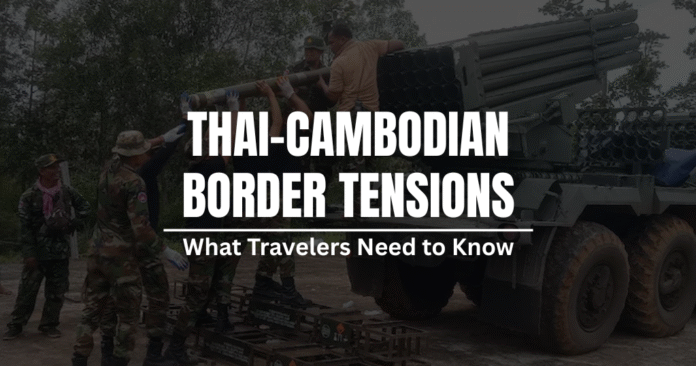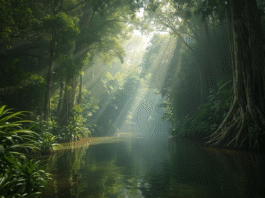Tensions are once again brewing at the Thailand-Cambodia border, prompting concern among tourists, travel agencies, and foreign embassies. As geopolitical friction escalates, many travelers—especially Indian tourists—are asking: Is it safe to travel to Thailand and Cambodia right now? In this blog, we dive into the current situation, what triggered the conflict, safety advisories, and what it means for your travel plans.
What’s Happening at the Thailand-Cambodia Border in 2025?
Recent military clashes and border disputes between Thailand and Cambodia have reignited long-standing tensions over the Preah Vihear Temple region, a site both nations have historically claimed. The temple, which sits near the northern Cambodian province of Preah Vihear, is culturally significant and has been a flashpoint for border-related hostility since the early 2000s.
Trigger for the Latest Escalation
Reports indicate that Thai and Cambodian forces exchanged gunfire in mid-July 2025, leading to injuries on both sides. The Thai military claims the clash began after Cambodian forces crossed into Thai territory, while Cambodian officials accused Thai troops of violating their sovereignty.
Historical Background: Why Is the Preah Vihear Temple Region Disputed?
The roots of the conflict lie in a decades-long territorial dispute surrounding the Preah Vihear Temple, a 900-year-old Hindu-Khmer structure located atop a cliff in the Dângrêk Mountains.
Key Historical Points:
- In 1962, the International Court of Justice (ICJ) ruled that the temple belonged to Cambodia (ICJ Judgment PDF).
- However, surrounding land (4.6 square kilometers) remains contested to this day.
- Violent clashes occurred in 2008, 2010, and 2011, causing dozens of deaths and thousands of evacuations.
- Despite a 2013 clarification by the ICJ calling for troop withdrawal and peaceful resolution, enforcement remains weak.
Official Thai statement: Ministry of Foreign Affairs, Thailand
Cambodian response: Ministry of Foreign Affairs and International Cooperation, Cambodia
Travel Safety: What You Need to Know
Indian Embassy Issues Travel Advisory
On July 23, 2025, the Indian Embassy in Thailand issued a formal travel advisory urging Indian nationals to exercise extreme caution if traveling near the Thailand-Cambodia border. While major tourist hubs like Bangkok, Phuket, Chiang Mai, Siem Reap, and Phnom Penh remain unaffected, the embassy has advised avoiding travel to border provinces, especially Surin, Sisaket, and Preah Vihear.
Embassy Advisory: “Avoid non-essential travel to the border regions. Indian citizens already in these areas should remain indoors, monitor local news, and follow instructions from Thai authorities.”
Impact on Tourism in 2025
While the situation is localized, the psychological impact on tourism is undeniable. Thailand and Cambodia are among the top travel destinations for Indian and international tourists alike. According to the Tourism Authority of Thailand, nearly 1.8 million Indian tourists visited Thailand in 2024, and the number was expected to rise this year.
If tensions escalate or persist, there could be:
- A drop in cross-border tourism packages
- Cancellation of regional tours near the border
- Heightened airport screenings and road checkpoint activity
Areas to Avoid Near the Thailand-Cambodia Border
If you’re planning a trip to either country, steer clear of the following areas until tensions de-escalate:
In Thailand:
- Sisaket Province: Proximity to Preah Vihear makes it vulnerable during any conflict.
- Surin Province: Another hotspot for troop movements and road closures.
- Ubon Ratchathani: While mostly peaceful, parts of it border Cambodia and may experience troop buildup.
In Cambodia:
- Preah Vihear Province: The center of the dispute; avoid completely.
- Oddar Meanchey: Has seen past military activity and may host Cambodian troops.
- Banteay Meanchey: While not directly involved, it borders Thailand and is under observation.
What Are the Authorities Saying?
Thai Government’s Statement
Thailand’s Ministry of Foreign Affairs has stated that the situation is “under control” and that both countries are working through diplomatic channels. However, military patrols and checkpoints have increased, and foreign nationals are advised not to travel near the border without prior permission.
Cambodian Government’s Response
Cambodia has accused Thai troops of provocation but maintains that it wants to resolve the issue peacefully and diplomatically. Cambodian authorities have also tightened border controls, particularly around Preah Vihear.
What Should Tourists and Expats Do Right Now?
If you are currently in Thailand or Cambodia, follow these safety steps:
- Register with your Embassy: Let your home country’s embassy know your current location.
- Avoid travel to border provinces: Especially if you’re on a backpacking trip or a cross-country bike tour.
- Follow local news channels and official sources: Thai PBS, Bangkok Post, Phnom Penh Post.
- Download travel apps with real-time security alerts (like SmartTraveller, Sitata).
- Have travel insurance that covers emergency evacuation.
- Keep emergency contacts handy: The Indian Embassy in Thailand can be reached at:
- ☎️ +66-2-2580300 or +66-2-2580301
- 📧 cons.bangkok@mea.gov.in
Are Major Tourist Cities Safe?
Yes—Bangkok, Pattaya, Phuket, Chiang Mai, Siem Reap, Phnom Penh, and other urban centers remain completely safe and unaffected by the border tensions. Flights, public transport, and hospitality services are running normally. There’s no travel ban in place for these areas.
However, if you’re planning an adventure or cultural trip near the border, postpone or reroute your itinerary.
How Is the Tourism Industry Responding?
Thailand and Cambodia rely heavily on tourism, particularly from India, China, and Europe. According to the Tourism Authority of Thailand (TAT):
- Over 1.8 million Indian travelers visited Thailand in 2024.
- Cambodia saw rising Indian tourism numbers post-COVID, especially due to spiritual and cultural attractions.
Despite the conflict, there has been no mass cancellation of flights or bookings. However:
- Cross-border bus and rail routes may be temporarily suspended.
- Some domestic flights and tour packages near the border may be altered.
Check for updates via:
What Safety Measures Should Tourists Take?
Here’s a checklist to ensure your trip remains safe and hassle-free:
Before You Travel:
- Check official travel advisories from your home country
- Register your trip with your embassy or consulate
- Purchase comprehensive travel insurance that includes political unrest and emergency evacuation
- Install real-time travel alert apps:
- Sitata
- SmartTraveller (Australian Govt.)
- Re-open EU (for European travelers)
While in Thailand or Cambodia:
- Avoid all political gatherings or demonstrations
- Do not enter restricted border zones, even if guided
- Monitor local news outlets:
- Stay in contact with your hotel staff, local guide, or embassy
Diplomatic and UN Involvement
The situation has caught the attention of international peacekeeping bodies. While the UN has not issued a resolution yet, both countries are UN members and are being urged to seek mediation if tensions persist.
Reference: UN Charter on Peaceful Settlement of Disputes – Chapter VI
ASEAN (Association of Southeast Asian Nations) has also offered to mediate, although official talks have yet to begin.




